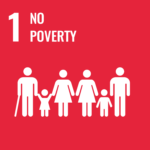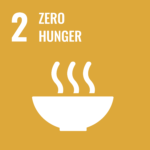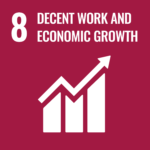THE SDGs

End poverty in all its forms everywhere
Biocyclic vegan agriculture can make an important contribution to the development of predominantly smallholder agriculture in so-called developing countries as it provides local farms with methods for establishing a closed-loop economy that is capable of permanently increasing soil fertility through the use of locally available resources, thus also ensuring long-term, sustainable security of yields that are entirely derived from plant-based sources, without the need to become economically dependent on industrial fertilizer and pesticide manufacturers.
Due to the increase of yields caused by using carbon stabilized forms of plant based organic matter like ripe compost derivates or humus soil people involved in subsistence farming become able to actively participate in food chain and thus can contribute to mitigating land poverty and urban scarcity. Also urban poverty can be faced by spreading plant-based and thus biocyclic vegan standard compatible urban farming techniques using primarily biocyclic humus soil as a substrate for planting vegetables and fruit in pots, bags or other containers on roofs or other sealed surfaces.

End hunger, achieve food security and improved nutrition and promote sustainable agriculture
By systematically improving soil fertility, increasing productivity through the introduction of nature-like cultivation methods and a more efficient land use through the exclusive production of plant foods for human consumption (not for animal feed), biocyclic vegan agriculture can make a sustainable contribution to global food security. Moreover, the use of carbon stabilized biocyclic humus soil as a derivate of high quality compost production can help to increase yields considerably and by this to improve productivity in agriculture.

Ensure healthy lives and promote well-being for all at all ages
Owing to the absence of animal husbandry for commercial use and slaughter and the non-use of fertilizers and other preparations of animal origin, the risk of contamination by drug residues from livestock farming (e.g. antibiotics) by pathogenic, partly multi-resistant germs from liquid slurry and slaughter waste and contributions to outbreaks of epidemic and pandemic human diseases, especially zoonoses like Covid-19, is significantly reduced in biocyclic vegan agriculture. Healthy soils contribute to human health through robust, vital plants rich in nutrients, according to the motto “from a healthy soil to healthy plants and healthy human beings”.

Ensure inclusive and equitable quality education and promote lifelong learning opportunities for all
Biocyclic vegan organisations offer several educational programs to educate about responsible and sustainable ways to grow food and treat our direct environment. These food skills are essential to live and the continuation of live and include many aspects of regular schooling programs, for example: Help with the conversion to biocyclic-vegan cultivation and any problems that may arise by using this method. Implementing the Biocyclic Vegan Standard either in commercial, or in small scale or even subsistence farming systems teaches people to better understand natural procedures and the benefits of adapting natural agricultural practices based on the principles of recycling (compost, humus soil, mulching), saving of resources (energy, water, land) and mixed culture (including agroforestry and permacultural aspects).

Achieve gender equality and empower all women and girls
As biocyclic vegan agriculture does not require either labour-and cost-intensive livestock farming or the use of expensive industrial fertilizers and pesticides it can potentially help women to overcome persistent obstacles and economic constraints limiting further inclusion in agriculture, especially in developing countries. The role of women in traditional rural societies is strengthened by the ability to produce a broader range of agricultural products in house gardens or by overcoming subsistence agriculture.

Ensure availability and sustainable management of water and sanitation for all
By using mature compost of plant-based origin and especially biocyclic humus soil, which is characterised by a physiologically stable molecular structure, it is possible to greatly reduce leaching, e.g. of nitrate, which leads to an improvement in groundwater quality and counteracts the eutrophication of surface waters. This will contribute to improving the provision of clean drinking water.

Ensure access to affordable, reliable, sustainable and modern energy for all
Producing compost, one of the central points of implementing the Biocyclic Vegan Standard in order to create sustainable soil fertility with the help of aerobic biodegradation methods, is an exotherm process that can be used as a natural source of energy for heating greenhouses located near the compost plant or for local public hot water supply.
Depending on the availability of plant-based raw materials biogas production for producing electricity can also be part of the process fully compatible with the biocyclic vegan agriculture. In addition, the fermentation residues of these processes can be used for composting.

Promote sustained, inclusive and sustainable economic growth, full and productive employment and decent work for all
As in the long run further economic growth cannot be achieved sustainably by applying the currently predominant form of conventional intensive agriculture, biocyclic vegan farming can make an important contribution to a future more sustainable and nature-based agriculture.

Build resilient infrastructure, promote inclusive and sustainable industrialization and foster innovation
The need of fully ripe high-quality plant-based compost, substrates and humus soil for implementing biocyclic vegan practices in agriculture is huge. A network of local compost plants has to be established adopting innovative technologies of producing and collecting plant-based raw materials including algae and accelerating the degradation process as well as adapting agricultural technology necessary for the distribution of compost and humus soil both in small scale and large scale agriculture.
In addition: If innovation is also understood as a methodological and/or social innovation, there are certainly points of reference here, since biocyclic vegan agriculture is a promising niche innovation in the food system that has both significant sustainability and transformation potential.

Reduce inequality within and among countries
In addition to Biocyclic Vegan Agriculture contributing to reduce inequalities for human individuals as earlier described by SDG 1 and 5, this kind of farming is also contributing to reduce inequality between species.
When mentioning the need to reduce inequalities within and among countries, the implicit statement is made that this only involves human entities. In these times more and more people open up to the idea that non-human entities also deserve the right of a full potential and dignified life as a living species and that they are not mechanical products. Following previous equality revolutions, such as the ones fought for race, gender and sexuality equality, we take the stance that non-human individuals should not suffer unnecessarily in order for our species to thrive economically. Biocyclic vegan agriculture is the proof that it is possible to produce healthy and ecologically responsible food without any form of animal exploitation.

Make cities and human settlements inclusive, safe, resilient and sustainable
We can think along with cities on how these methods can be adapted to city or near-city life to support adequate and responsible food supply.
Quality composts and biocyclic humus soil can easily be produced on small and larger scales and are thus a very helpful tool for successful urban gardening and farming.

Ensure sustainable consumption and production patterns
Biocyclic vegan agriculture (production) contributes to the attainment of all SDGs. Food from this kind of farming supports promoting sustainable and healthy diets (consumption). Both being elements of the food value chain have high potentials to contribute to the necessary transformation of food systems towards sustainability.

Take urgent action to combat climate change and its impacts
By consistently refraining from keeping livestock for commercial use and slaughter and by using purely plant-based high-quality compost or even biocyclic humus soil with its high CO2 binding capacity, biocyclic vegan agriculture makes an effective contribution to climate protection.

Conserve and sustainably use the oceans, seas and marine resources for sustainable development
By using mature compost of plant-based origin and biocyclic humus soil, which is characterized by a physiologically stable molecular structure, it is possible to greatly reduce leaching, e.g. of nitrate, which leads to an improvement in groundwater quality and counteracts the eutrophication of surface waters including marine waters.
Moreover, the use of aquatic organisms like algae for the production of plant-based fertilizers, compost and plant protection preparations helps recycling nutrients which have been discharged into the marine environment and which are needed for closing the nutrient cycles especially of N and P.

Protect, restore and promote sustainable use of terrestrial ecosystems, sustainably manage forests, combat desertification, and halt and reverse land degradation and halt biodiversity loss
Biocyclic vegan agriculture implies the preservation and/or regeneration of natural soil fertility. This is achieved by a high supply of organic matter in various forms such as green manure, mulching, the spreading of mature purely plant-based compost and the extensive use of biocyclic humus soil, which protects the soil from erosion, dehydration and thus desertification, significantly binds CO2 and stimulates the formation of permanent humus.
The establishment of a natural ecological balance is an important principle for preventive plant protection and the promotion of biodiversity. Biodiversity rises significantly on areas cultivated according to the biocyclic vegan principles, which is achieved through wide crop rotations, systematic mixed cultivation, a careful and diversified tilling of the soil, the planting of hedges and flower strips as well as the creation of habitats within the farm area.
In addition, biocyclic vegan farmland not only provides ideal living conditions for billions of microorganisms in the soil, but also for many other wild animals such as birds and rare insects. This leads to a natural state of equilibrium above and below ground.

Promote peaceful and inclusive societies for sustainable development, provide access to justice for all and build effective, accountable and inclusive institutions at all levels
The whole basics of our methods are based on compassion, on all levels: humans, nature, animals. We are a strong, friendly and non-financial-profit based community.

Strengthen the means of implementation and revitalize the Global Partnership for Sustainable Development
As a worldwide network, we engage on all sorts of levels (producers, consumers, retail, land resources, government, schools) to support responsible and sustainable food value chains.
Biocyclic Vegan International supports the Beyond Cruelty Foundation’s SDG18 Campaign for Zero Animal Exploitation.
Zero Animal Exploitation
The aim of the Beyond Cruelty Foundation’s SDG18 Campaign for Zero Animal Exploitation is to cause the United Nations (UN) to add a new Sustainable Development Goal (SDG), #18 – Zero Animal Exploitation, to its current list of SDGs and so cause the countries of the world to adopt policies that seek to reduce and ideally remove human beings’ reliance on animals for human use and consumption.
Sign the petition and help bring SDG 18 Zero Animal Exploitation to the UN’s agenda.
Credits SDG icons: UN Sustainable Development Knowledge Platform
Credits SDG 18 icon: Beyond Cruelty Platform



